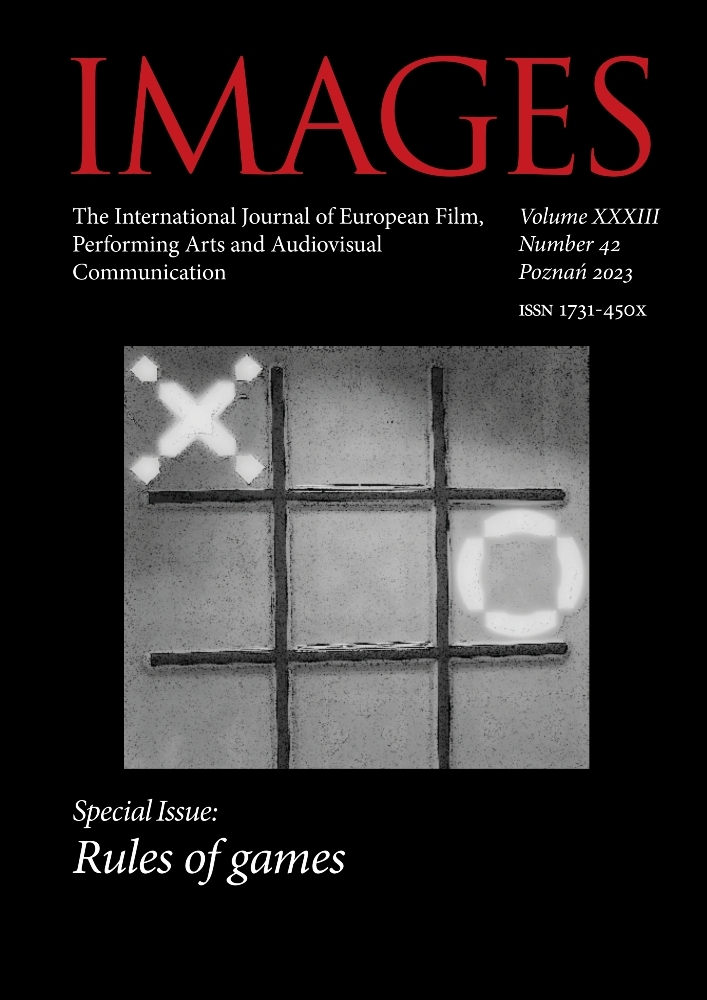Abstract
The latest and increasingly sophisticated digital simulations, often set in fantastical worlds, have become like laboratories in which players/ audiences can test their knowledge of culture, their ethical beliefs, interpretive skills, and anthropological imaginations. The article looks at games not just through the lens of their programmed poetics, but rather as laboratories in which experimentation becomes one of the elements of play, and gameplay touches the essence of the game – the activity, which is defined as dynamic competition within an adopted convention. One example of such experimentation is the transgressive way of conducting gameplay. However, creating a detailed typology of all possible transgressive gameplay is clearly not feasible, especially when taking into account accidental situations, such as when a player exploits a loophole or error in the programmed process without realizing that they are intentionally bypassing solutions designed by the creators. Nonetheless, intentional actions can be characterized in terms of three basic aspects – ingression (e.g., interference with computer programs), progression (e.g., fastrun, bypassing, etc.), and regression (transpositions, refunctionalizations, etc.). They concern both evidence of specific intentions and reveal ways of breaking rules, introducing one’s own rules, or forcing one’s own gameplay style.
References
Aarseth E., Walczyłem przeciw prawu: wywrotowa gra i gracz implikowany, „Kultura i Historia” 2008, nr 13, http://www.kulturaihistoria.umcs.lublin.pl/pl/archives/884 (dostęp: 10.10.2022)
Blizzard Entertainmen, Learn About the Mythic+ Dungeon Rating in Chains of Domination, 14.06.2021, https://worldofwarcraft.com/en-us/news/23686103/learn-about-the-mythic-dungeon-rating-in-chains-of-domination (dostęp: 10.10.2022)
Bugla P., Seweryn M., Stasik K., Regresja statystyczna, Statystyka od A do Z, https://www.statystyka.az.pl/regresja-statystyczna.php (dostęp: 10.10.2022)
Feibel T., Zabójca w dziecinnym pokoju: przemoc i gry komputerowe, przeł. A. Malinow, Warszawa 2006
Gadamer H.-G., Aktualność piękna. Sztuka jako gra, symbol i święto, przeł. K. Krzemieniowa, Warszawa 1993
Huizinga J., Homo ludens. Zabawa jako źródło kultury, przeł. M. Kurecka, W. Wirpsza, Warszawa 1985
Jakubowicz J., Fallout 4 – wszystkie apokalipsy są takie same, benchmark.pl, 13.12.2015, https://www.benchmark.pl/testy_i_recenzje/fallout-4-niespelnione-nadzieje.html (dostęp: 10.10.2022)
Kłosiński M., Hermeneutyka gier wideo. Interpretacja, immersja, utopia, Warszawa 2018
Kochanowicz R., Fabularyzowane gry komputerowe w przestrzeni humanistycznej. Analizy, interpretacje i wnioski z pogranicza poetyki, aksjologii i dydaktyki literatury, Poznań, 2012
Kochanowicz R., Kosmos zmodyfikowany* – wybrane gry symulacyjne w kontekście kultury uczestnictwa, „Literatura i Kultura Popularna” 2019, nr 25, s. 495–510. DOI: https://doi.org/10.19195/0867-7441.25.28
Kochanowicz R., Zmiennik wybawiony albo tryumf wiedźmina. Cyfrowy dialog z kulturą i obyczajowością(Wiedźmin 3), „Literatura i Kultura Popularna” 2018, nr 24, s. 313–327 DOI: https://doi.org/10.19195/0867-7441.24.20
Koumarelas R., Fallout 4: Understanding Carry Weight (& How to Increase It), CBR.com, 14.12.2020, https://www.cbr.com/fallout-4-carry-weight/ (dostęp: 10.10.2022)
Noga H., Bohaterowie gier komputerowych: Implikacje pedagogiczne, Kraków 2005
Pötzsch H., Forms and Practices of Transgressivity in Videogames: Aesthetics, Play, and Politics, [w:] Transgression in Games and Play, red. K. Jørgensen, F. Karlsen, Cambridge, MA – London 2018, s. 45–63 DOI: https://doi.org/10.7551/mitpress/11550.003.0006
Salen K., Zimmerman E., Rules of Play: Game Design Fundamentals, Cambridge, MA – London 2004
Stewart B., Personality And Play Styles: A Unified Model, Game Developer, 1.08.2011, https://www.gamedeveloper.com/design/personality-and-play-styles-a-unified-model (dostęp: 10.10.2022)
Tanenbaum T.J., How I Learned to Stop Worrying and Love the Gamer: Reframing Subversive Play in Story-Based Games, DiGRA Conference 2013, https://www.semanticscholar.org/paper/How-I-Learned-to-Stop-Worrying-and-Love-the-Gamer%3A-Tanenbaum/50d0c9cf687d7b3e87675684205ac8274556a89b (dostęp: 10.10.2022)
Ulfik-Jaworska I., Komputerowi mordercy. Tendencje konstruktywne i destruktywne u graczy komputerowych, Lublin 2005
Wilson I., Skyrim cheats and console commands to Godmode your way across Tamriel, GamesRadar, 3.11.2022, https://www.gamesradar.com/skyrim-cheats/ (dostęp: 10.10.2022)
Winiarski M., Czym jest mechanika rozgrywki, mWin, 20.06.2016, https://mwin.pl/czym-mechanika-rozgrywki/ (dostęp: 10.10.2022)
https://elderscrolls.fandom.com/f/p/2469512955822081249 (dostęp: 10.10.2022)
https://creationclub.bethesda.net/en (dostęp: 10.10.2022)
https://help.bethesda.net/#en/answer/33787 (dostęp: 10.10.2022) DOI: https://doi.org/10.1109/ACCESS.2022.3162617
https://www.nexusmods.com/fallout4/mods/15639/ (dostęp: 10.10.2022)
https://www.speedrun.com/ (dostęp: 10.10.2022)
https://www.youtube.com/watch?v=T_fFApDyki4&ab_channel=ChuChuFuture (dostęp: 10.10.2022)
Fallout 4 (Bethesda Softworks, 2015)
No Man’s Sky, Hello Games, 2016
Star Wars: The Old Republic (LucasArts, Electronic Arts, 2012+)
The Elder Scrolls III: Morrowind (Bethesda Softworks, 2002)
The Elder Scrolls V: Skyrim (Bethesda Softworks, 2011)
Wiedźmin 3: Dziki Gon (CD Projekt Red, 2015)
World of Warcraft (Blizzard Entertainment, 2004+)
X3: Terran Conflict (Egosoft, 2008)
License
Copyright (c) 2023 Rafał Kochanowicz

This work is licensed under a Creative Commons Attribution 4.0 International License.

